MITS5003: Wireless Networks and Communication Assignment Solution 2019
VerifiedAdded on 2022/11/29
|11
|1453
|401
Homework Assignment
AI Summary
This assignment solution for MITS5003 Wireless Networks and Communication covers a range of topics including a comparative analysis of network access layers and IP layers in the TCP/IP protocol, illustrating the communication process between two Prime Ministers using translators and telephone lines. It also includes calculations for amplitude, time period, frequency, and phase angles for different waveforms. Furthermore, the solution presents calculations for free space loss (FSL), frequency analysis of signals, and channel capacity determination based on Nyquist theorem. The advantages and disadvantages of packet switching and circuit switching are discussed, along with calculations related to antenna height and signal transmission. The solution is supported by relevant references.

MITS5003: Wireless network and communication
Paraphrase This Document
Need a fresh take? Get an instant paraphrase of this document with our AI Paraphraser
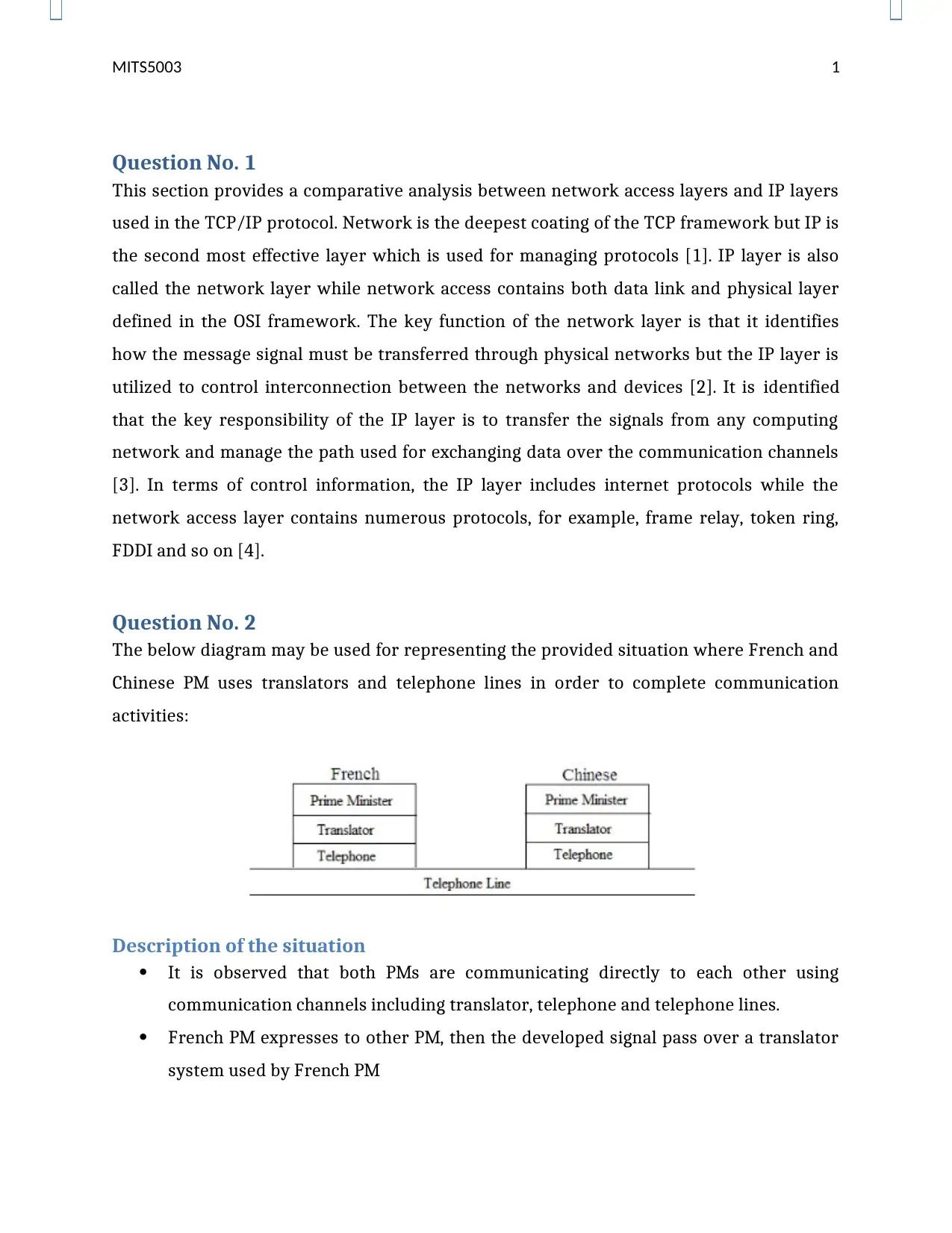
MITS5003 1
Question No. 1
This section provides a comparative analysis between network access layers and IP layers
used in the TCP/IP protocol. Network is the deepest coating of the TCP framework but IP is
the second most effective layer which is used for managing protocols [1]. IP layer is also
called the network layer while network access contains both data link and physical layer
defined in the OSI framework. The key function of the network layer is that it identifies
how the message signal must be transferred through physical networks but the IP layer is
utilized to control interconnection between the networks and devices [2]. It is identified
that the key responsibility of the IP layer is to transfer the signals from any computing
network and manage the path used for exchanging data over the communication channels
[3]. In terms of control information, the IP layer includes internet protocols while the
network access layer contains numerous protocols, for example, frame relay, token ring,
FDDI and so on [4].
Question No. 2
The below diagram may be used for representing the provided situation where French and
Chinese PM uses translators and telephone lines in order to complete communication
activities:
Description of the situation
It is observed that both PMs are communicating directly to each other using
communication channels including translator, telephone and telephone lines.
French PM expresses to other PM, then the developed signal pass over a translator
system used by French PM
Question No. 1
This section provides a comparative analysis between network access layers and IP layers
used in the TCP/IP protocol. Network is the deepest coating of the TCP framework but IP is
the second most effective layer which is used for managing protocols [1]. IP layer is also
called the network layer while network access contains both data link and physical layer
defined in the OSI framework. The key function of the network layer is that it identifies
how the message signal must be transferred through physical networks but the IP layer is
utilized to control interconnection between the networks and devices [2]. It is identified
that the key responsibility of the IP layer is to transfer the signals from any computing
network and manage the path used for exchanging data over the communication channels
[3]. In terms of control information, the IP layer includes internet protocols while the
network access layer contains numerous protocols, for example, frame relay, token ring,
FDDI and so on [4].
Question No. 2
The below diagram may be used for representing the provided situation where French and
Chinese PM uses translators and telephone lines in order to complete communication
activities:
Description of the situation
It is observed that both PMs are communicating directly to each other using
communication channels including translator, telephone and telephone lines.
French PM expresses to other PM, then the developed signal pass over a translator
system used by French PM
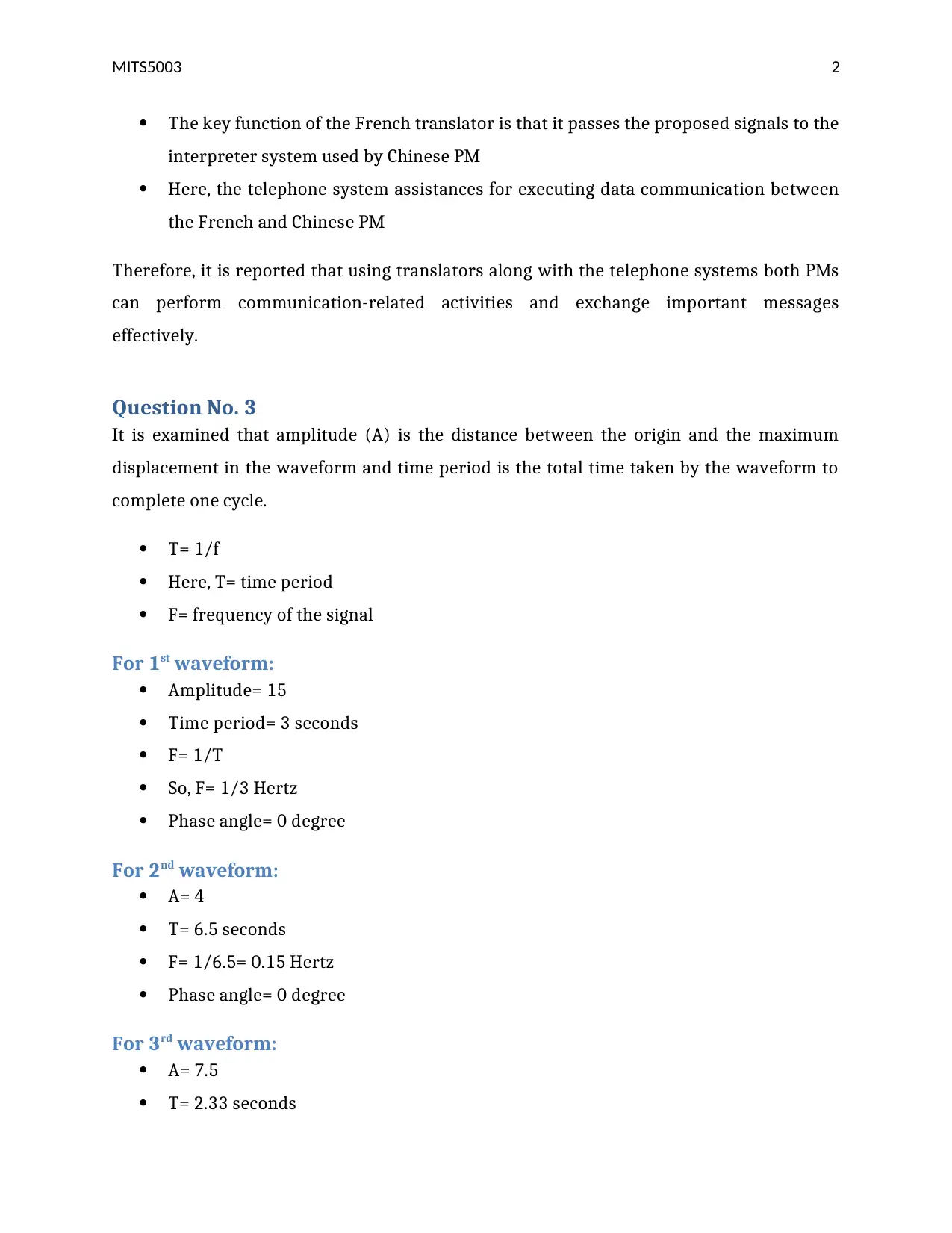
MITS5003 2
The key function of the French translator is that it passes the proposed signals to the
interpreter system used by Chinese PM
Here, the telephone system assistances for executing data communication between
the French and Chinese PM
Therefore, it is reported that using translators along with the telephone systems both PMs
can perform communication-related activities and exchange important messages
effectively.
Question No. 3
It is examined that amplitude (A) is the distance between the origin and the maximum
displacement in the waveform and time period is the total time taken by the waveform to
complete one cycle.
T= 1/f
Here, T= time period
F= frequency of the signal
For 1st waveform:
Amplitude= 15
Time period= 3 seconds
F= 1/T
So, F= 1/3 Hertz
Phase angle= 0 degree
For 2nd waveform:
A= 4
T= 6.5 seconds
F= 1/6.5= 0.15 Hertz
Phase angle= 0 degree
For 3rd waveform:
A= 7.5
T= 2.33 seconds
The key function of the French translator is that it passes the proposed signals to the
interpreter system used by Chinese PM
Here, the telephone system assistances for executing data communication between
the French and Chinese PM
Therefore, it is reported that using translators along with the telephone systems both PMs
can perform communication-related activities and exchange important messages
effectively.
Question No. 3
It is examined that amplitude (A) is the distance between the origin and the maximum
displacement in the waveform and time period is the total time taken by the waveform to
complete one cycle.
T= 1/f
Here, T= time period
F= frequency of the signal
For 1st waveform:
Amplitude= 15
Time period= 3 seconds
F= 1/T
So, F= 1/3 Hertz
Phase angle= 0 degree
For 2nd waveform:
A= 4
T= 6.5 seconds
F= 1/6.5= 0.15 Hertz
Phase angle= 0 degree
For 3rd waveform:
A= 7.5
T= 2.33 seconds
⊘ This is a preview!⊘
Do you want full access?
Subscribe today to unlock all pages.

Trusted by 1+ million students worldwide
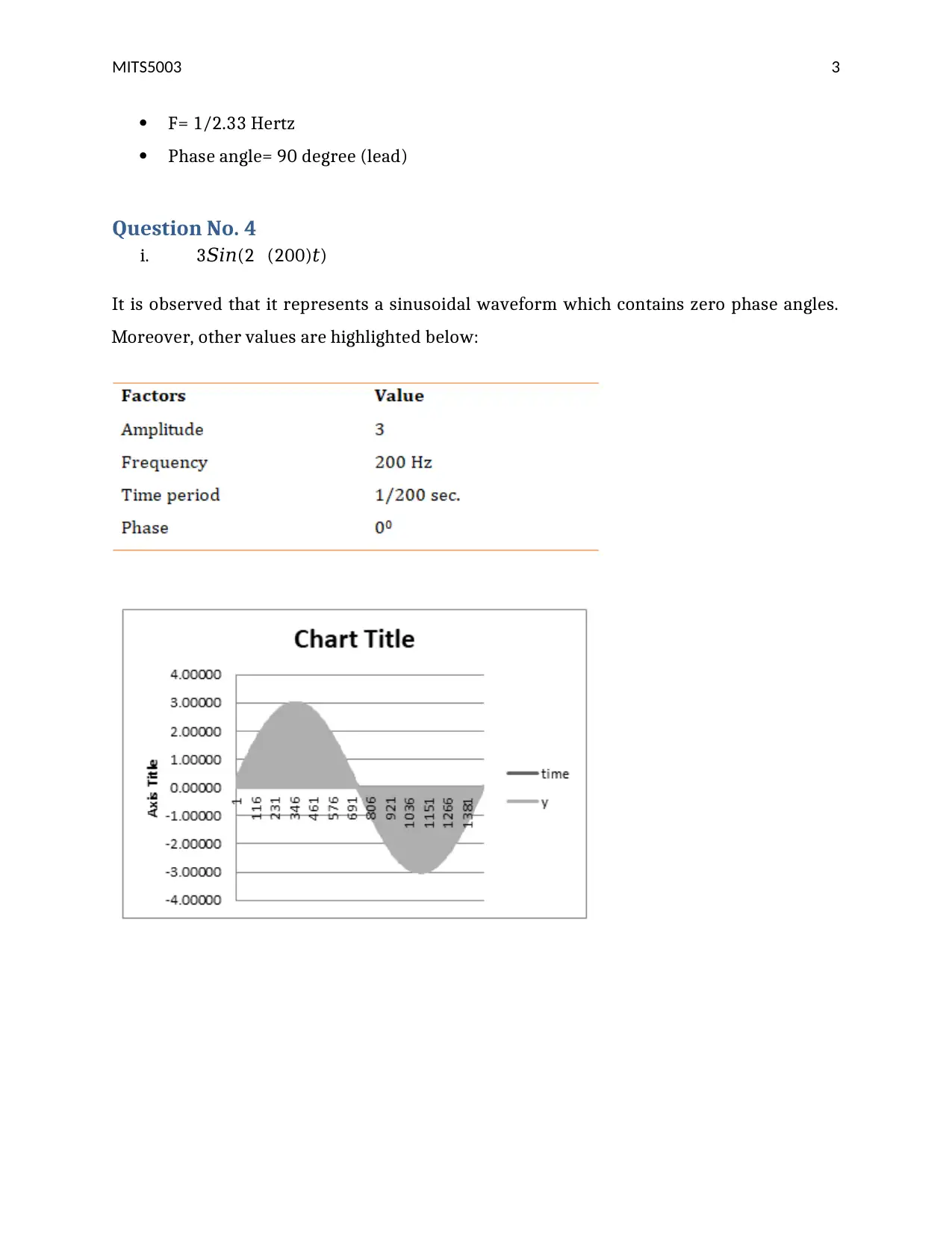
MITS5003 3
F= 1/2.33 Hertz
Phase angle= 90 degree (lead)
Question No. 4
i. 3𝑆𝑖𝑛(2𝜋 (200)𝑡)
It is observed that it represents a sinusoidal waveform which contains zero phase angles.
Moreover, other values are highlighted below:
F= 1/2.33 Hertz
Phase angle= 90 degree (lead)
Question No. 4
i. 3𝑆𝑖𝑛(2𝜋 (200)𝑡)
It is observed that it represents a sinusoidal waveform which contains zero phase angles.
Moreover, other values are highlighted below:
Paraphrase This Document
Need a fresh take? Get an instant paraphrase of this document with our AI Paraphraser
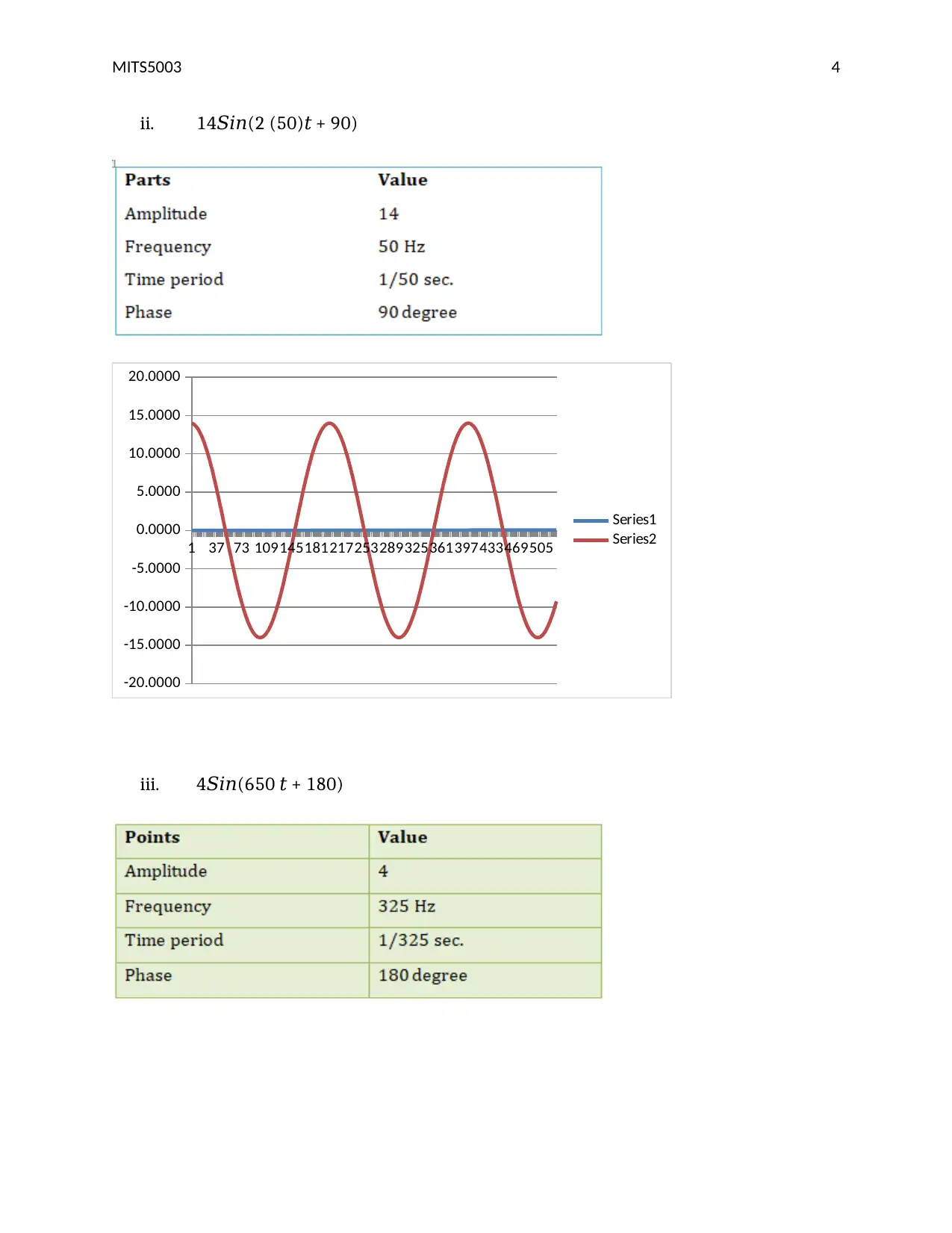
MITS5003 4
ii. 14𝑆𝑖𝑛(2𝜋(50)𝑡 + 90)
1 37 73 109145181217253289325361397433469505
-20.0000
-15.0000
-10.0000
-5.0000
0.0000
5.0000
10.0000
15.0000
20.0000
Series1
Series2
iii. 4𝑆𝑖𝑛(650𝜋𝑡 + 180)
ii. 14𝑆𝑖𝑛(2𝜋(50)𝑡 + 90)
1 37 73 109145181217253289325361397433469505
-20.0000
-15.0000
-10.0000
-5.0000
0.0000
5.0000
10.0000
15.0000
20.0000
Series1
Series2
iii. 4𝑆𝑖𝑛(650𝜋𝑡 + 180)
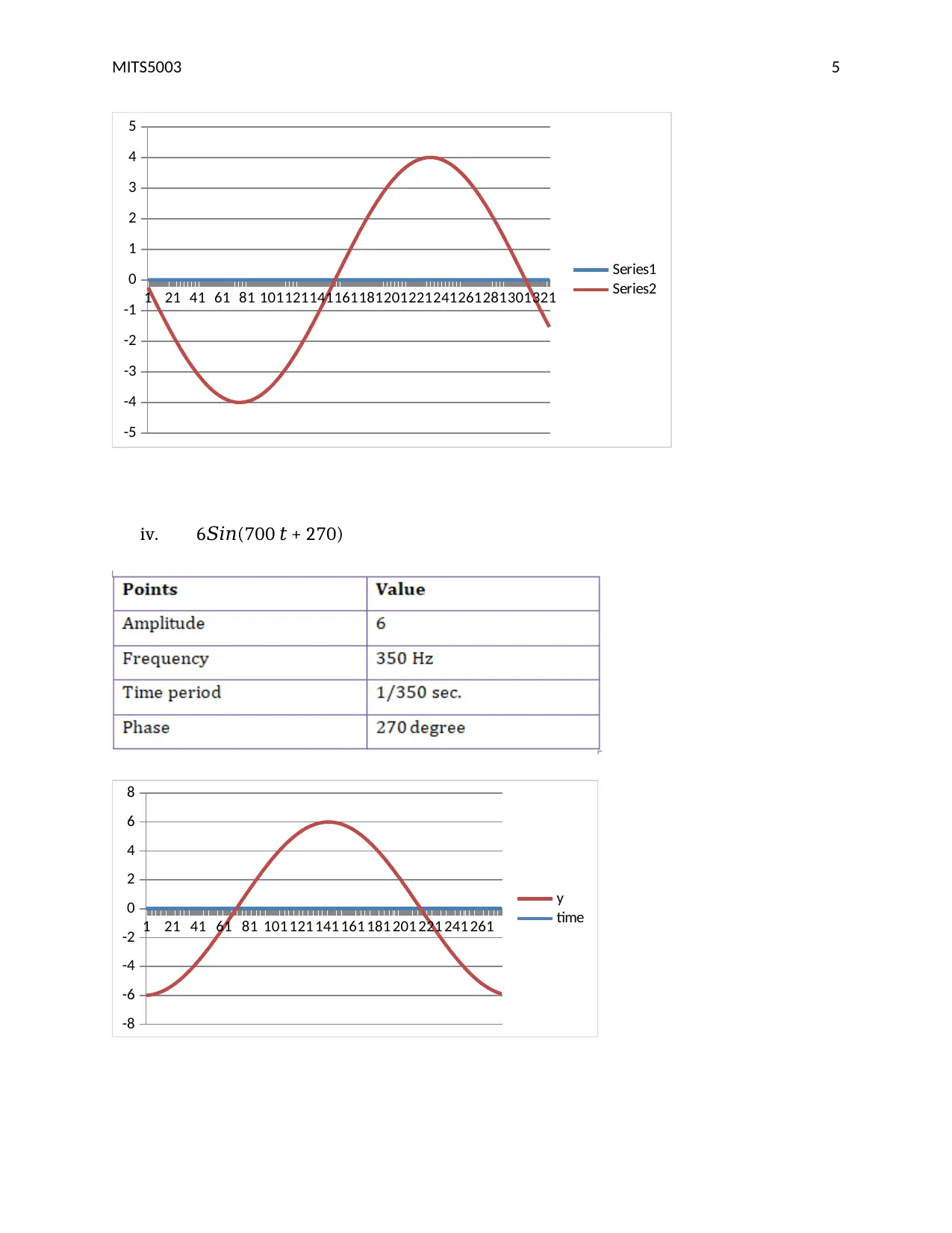
MITS5003 5
1 21 41 61 81 101121141161181201221241261281301321
-5
-4
-3
-2
-1
0
1
2
3
4
5
Series1
Series2
iv. 6𝑆𝑖𝑛(700𝜋𝑡 + 270)
1 21 41 61 81 101 121 141 161 181 201 221 241 261
-8
-6
-4
-2
0
2
4
6
8
y
time
1 21 41 61 81 101121141161181201221241261281301321
-5
-4
-3
-2
-1
0
1
2
3
4
5
Series1
Series2
iv. 6𝑆𝑖𝑛(700𝜋𝑡 + 270)
1 21 41 61 81 101 121 141 161 181 201 221 241 261
-8
-6
-4
-2
0
2
4
6
8
y
time
⊘ This is a preview!⊘
Do you want full access?
Subscribe today to unlock all pages.

Trusted by 1+ million students worldwide
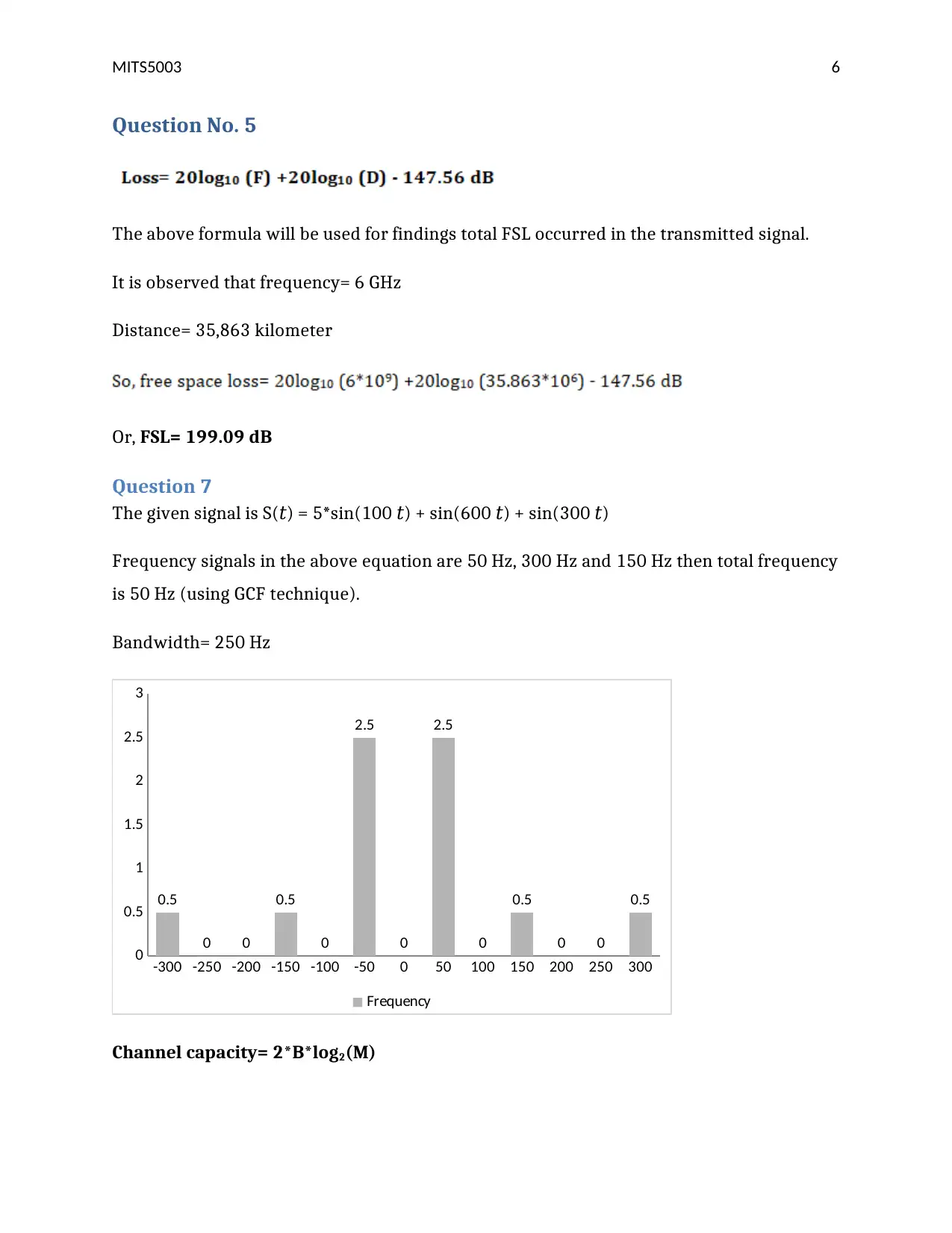
MITS5003 6
Question No. 5
The above formula will be used for findings total FSL occurred in the transmitted signal.
It is observed that frequency= 6 GHz
Distance= 35,863 kilometer
Or, FSL= 199.09 dB
Question 7
The given signal is S(𝑡) = 5*sin(100𝜋𝑡) + sin(600𝜋𝑡) + sin(300𝜋 )𝑡
Frequency signals in the above equation are 50 Hz, 300 Hz and 150 Hz then total frequency
is 50 Hz (using GCF technique).
Bandwidth= 250 Hz
-300 -250 -200 -150 -100 -50 0 50 100 150 200 250 300
0
0.5
1
1.5
2
2.5
3
0.5
0 0
0.5
0
2.5
0
2.5
0
0.5
0 0
0.5
Frequency
Channel capacity= 2*B*log2(M)
Question No. 5
The above formula will be used for findings total FSL occurred in the transmitted signal.
It is observed that frequency= 6 GHz
Distance= 35,863 kilometer
Or, FSL= 199.09 dB
Question 7
The given signal is S(𝑡) = 5*sin(100𝜋𝑡) + sin(600𝜋𝑡) + sin(300𝜋 )𝑡
Frequency signals in the above equation are 50 Hz, 300 Hz and 150 Hz then total frequency
is 50 Hz (using GCF technique).
Bandwidth= 250 Hz
-300 -250 -200 -150 -100 -50 0 50 100 150 200 250 300
0
0.5
1
1.5
2
2.5
3
0.5
0 0
0.5
0
2.5
0
2.5
0
0.5
0 0
0.5
Frequency
Channel capacity= 2*B*log2(M)
Paraphrase This Document
Need a fresh take? Get an instant paraphrase of this document with our AI Paraphraser
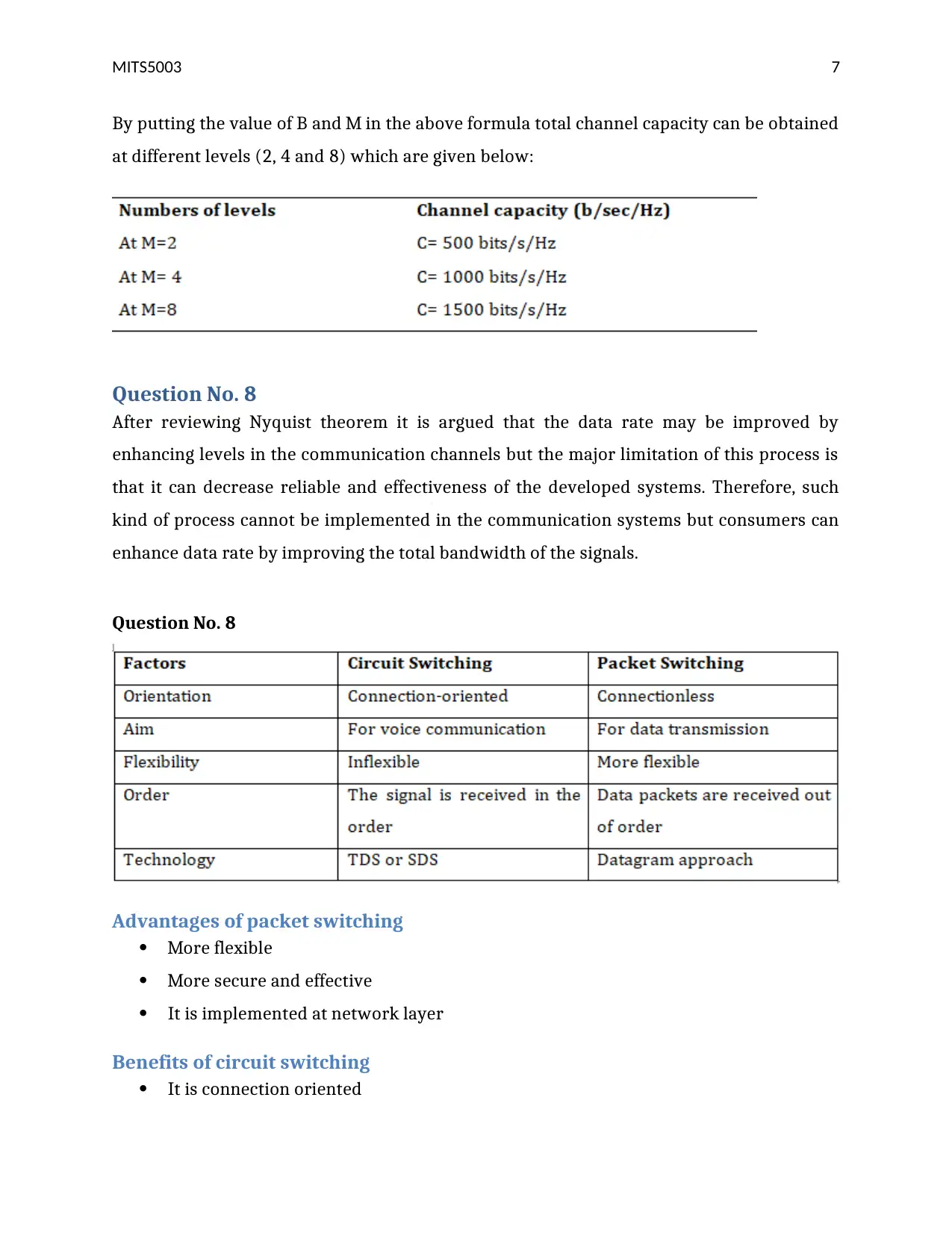
MITS5003 7
By putting the value of B and M in the above formula total channel capacity can be obtained
at different levels (2, 4 and 8) which are given below:
Question No. 8
After reviewing Nyquist theorem it is argued that the data rate may be improved by
enhancing levels in the communication channels but the major limitation of this process is
that it can decrease reliable and effectiveness of the developed systems. Therefore, such
kind of process cannot be implemented in the communication systems but consumers can
enhance data rate by improving the total bandwidth of the signals.
Question No. 8
Advantages of packet switching
More flexible
More secure and effective
It is implemented at network layer
Benefits of circuit switching
It is connection oriented
By putting the value of B and M in the above formula total channel capacity can be obtained
at different levels (2, 4 and 8) which are given below:
Question No. 8
After reviewing Nyquist theorem it is argued that the data rate may be improved by
enhancing levels in the communication channels but the major limitation of this process is
that it can decrease reliable and effectiveness of the developed systems. Therefore, such
kind of process cannot be implemented in the communication systems but consumers can
enhance data rate by improving the total bandwidth of the signals.
Question No. 8
Advantages of packet switching
More flexible
More secure and effective
It is implemented at network layer
Benefits of circuit switching
It is connection oriented
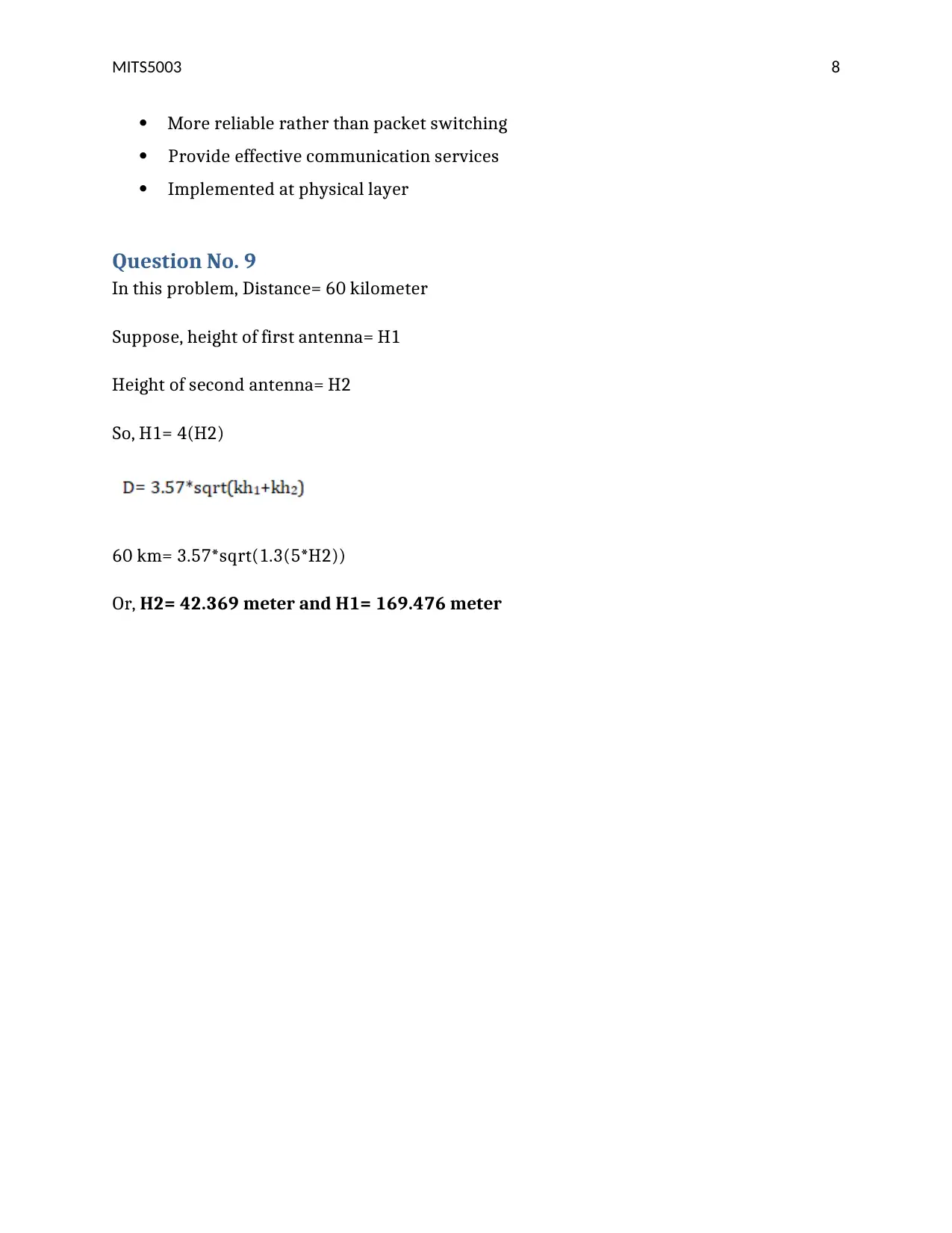
MITS5003 8
More reliable rather than packet switching
Provide effective communication services
Implemented at physical layer
Question No. 9
In this problem, Distance= 60 kilometer
Suppose, height of first antenna= H1
Height of second antenna= H2
So, H1= 4(H2)
60 km= 3.57*sqrt(1.3(5*H2))
Or, H2= 42.369 meter and H1= 169.476 meter
More reliable rather than packet switching
Provide effective communication services
Implemented at physical layer
Question No. 9
In this problem, Distance= 60 kilometer
Suppose, height of first antenna= H1
Height of second antenna= H2
So, H1= 4(H2)
60 km= 3.57*sqrt(1.3(5*H2))
Or, H2= 42.369 meter and H1= 169.476 meter
⊘ This is a preview!⊘
Do you want full access?
Subscribe today to unlock all pages.

Trusted by 1+ million students worldwide
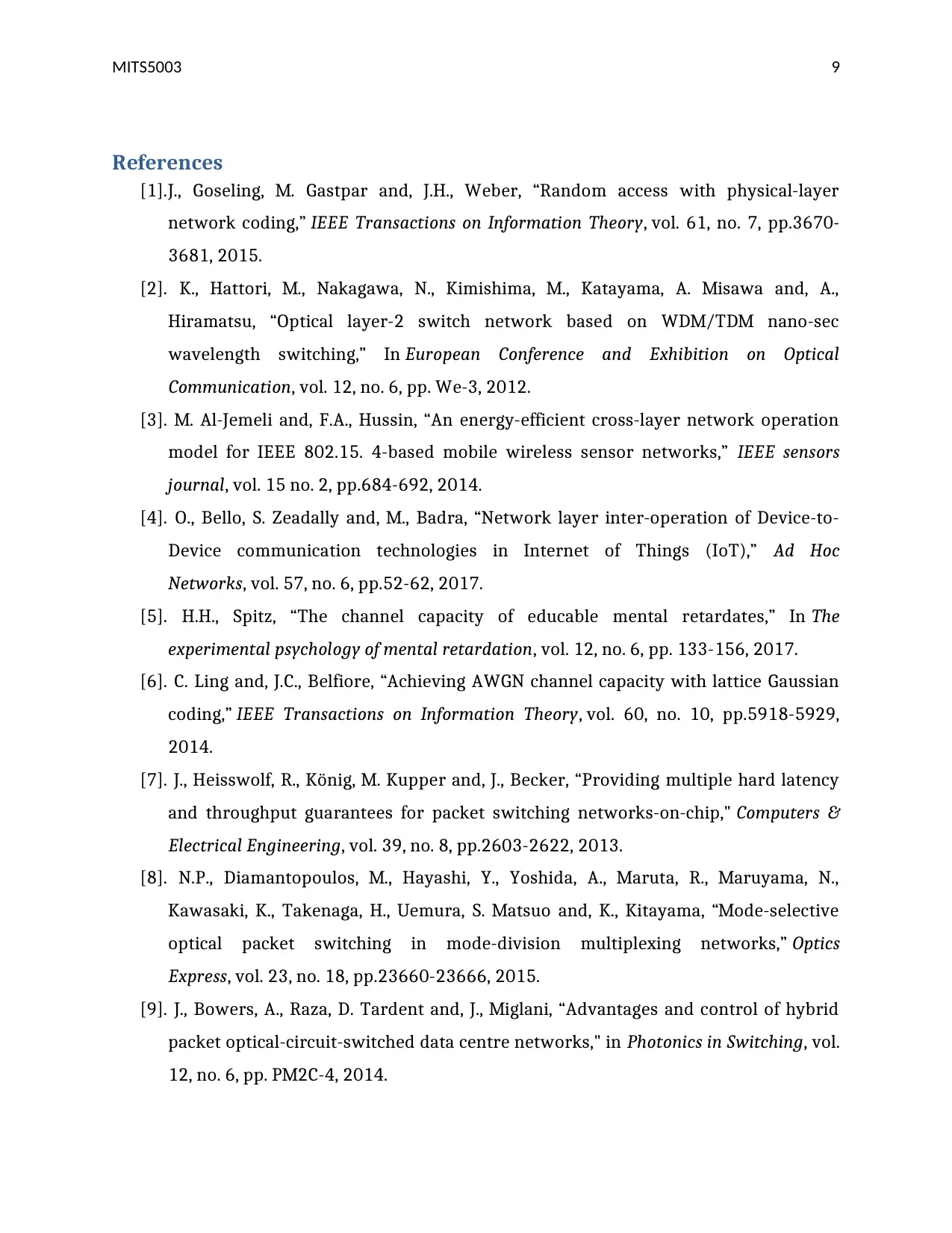
MITS5003 9
References
[1].J., Goseling, M. Gastpar and, J.H., Weber, “Random access with physical-layer
network coding,” IEEE Transactions on Information Theory, vol. 61, no. 7, pp.3670-
3681, 2015.
[2]. K., Hattori, M., Nakagawa, N., Kimishima, M., Katayama, A. Misawa and, A.,
Hiramatsu, “Optical layer-2 switch network based on WDM/TDM nano-sec
wavelength switching,” In European Conference and Exhibition on Optical
Communication, vol. 12, no. 6, pp. We-3, 2012.
[3]. M. Al-Jemeli and, F.A., Hussin, “An energy-efficient cross-layer network operation
model for IEEE 802.15. 4-based mobile wireless sensor networks,” IEEE sensors
journal, vol. 15 no. 2, pp.684-692, 2014.
[4]. O., Bello, S. Zeadally and, M., Badra, “Network layer inter-operation of Device-to-
Device communication technologies in Internet of Things (IoT),” Ad Hoc
Networks, vol. 57, no. 6, pp.52-62, 2017.
[5]. H.H., Spitz, “The channel capacity of educable mental retardates,” In The
experimental psychology of mental retardation, vol. 12, no. 6, pp. 133-156, 2017.
[6]. C. Ling and, J.C., Belfiore, “Achieving AWGN channel capacity with lattice Gaussian
coding,” IEEE Transactions on Information Theory, vol. 60, no. 10, pp.5918-5929,
2014.
[7]. J., Heisswolf, R., König, M. Kupper and, J., Becker, “Providing multiple hard latency
and throughput guarantees for packet switching networks-on-chip," Computers &
Electrical Engineering, vol. 39, no. 8, pp.2603-2622, 2013.
[8]. N.P., Diamantopoulos, M., Hayashi, Y., Yoshida, A., Maruta, R., Maruyama, N.,
Kawasaki, K., Takenaga, H., Uemura, S. Matsuo and, K., Kitayama, “Mode-selective
optical packet switching in mode-division multiplexing networks,” Optics
Express, vol. 23, no. 18, pp.23660-23666, 2015.
[9]. J., Bowers, A., Raza, D. Tardent and, J., Miglani, “Advantages and control of hybrid
packet optical-circuit-switched data centre networks," in Photonics in Switching, vol.
12, no. 6, pp. PM2C-4, 2014.
References
[1].J., Goseling, M. Gastpar and, J.H., Weber, “Random access with physical-layer
network coding,” IEEE Transactions on Information Theory, vol. 61, no. 7, pp.3670-
3681, 2015.
[2]. K., Hattori, M., Nakagawa, N., Kimishima, M., Katayama, A. Misawa and, A.,
Hiramatsu, “Optical layer-2 switch network based on WDM/TDM nano-sec
wavelength switching,” In European Conference and Exhibition on Optical
Communication, vol. 12, no. 6, pp. We-3, 2012.
[3]. M. Al-Jemeli and, F.A., Hussin, “An energy-efficient cross-layer network operation
model for IEEE 802.15. 4-based mobile wireless sensor networks,” IEEE sensors
journal, vol. 15 no. 2, pp.684-692, 2014.
[4]. O., Bello, S. Zeadally and, M., Badra, “Network layer inter-operation of Device-to-
Device communication technologies in Internet of Things (IoT),” Ad Hoc
Networks, vol. 57, no. 6, pp.52-62, 2017.
[5]. H.H., Spitz, “The channel capacity of educable mental retardates,” In The
experimental psychology of mental retardation, vol. 12, no. 6, pp. 133-156, 2017.
[6]. C. Ling and, J.C., Belfiore, “Achieving AWGN channel capacity with lattice Gaussian
coding,” IEEE Transactions on Information Theory, vol. 60, no. 10, pp.5918-5929,
2014.
[7]. J., Heisswolf, R., König, M. Kupper and, J., Becker, “Providing multiple hard latency
and throughput guarantees for packet switching networks-on-chip," Computers &
Electrical Engineering, vol. 39, no. 8, pp.2603-2622, 2013.
[8]. N.P., Diamantopoulos, M., Hayashi, Y., Yoshida, A., Maruta, R., Maruyama, N.,
Kawasaki, K., Takenaga, H., Uemura, S. Matsuo and, K., Kitayama, “Mode-selective
optical packet switching in mode-division multiplexing networks,” Optics
Express, vol. 23, no. 18, pp.23660-23666, 2015.
[9]. J., Bowers, A., Raza, D. Tardent and, J., Miglani, “Advantages and control of hybrid
packet optical-circuit-switched data centre networks," in Photonics in Switching, vol.
12, no. 6, pp. PM2C-4, 2014.
Paraphrase This Document
Need a fresh take? Get an instant paraphrase of this document with our AI Paraphraser

MITS5003 10
1 out of 11
Related Documents
Your All-in-One AI-Powered Toolkit for Academic Success.
+13062052269
info@desklib.com
Available 24*7 on WhatsApp / Email
![[object Object]](/_next/static/media/star-bottom.7253800d.svg)
Unlock your academic potential
Copyright © 2020–2026 A2Z Services. All Rights Reserved. Developed and managed by ZUCOL.



